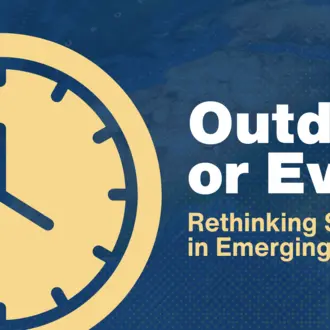Is Tunisia Poised to Become a Leading Deep Tech Hub in Africa and the Middle East?
Tunisia, a small country located in North Africa, is officially making big waves in the technology industry. With a rapidly evolving entrepreneurship and innovation ecosystem, Tunisia is little by little positioning itself as a leading entrepreneurship and innovation destination, particularly in deep tech. The news of Instadeep, a deep tech startup that was founded in 2014 in Tunisia by two Tunisians, Karim Beguir and Zohra Slim, being acquired by BioNTech for £362 million upfront and a remaining £200 million based on future performance, took the Tunisian entrepreneurship and innovation ecosystem by storm. Acquisitions like these are always seen as major milestones for evolving ecosystems. The story of Instadeep proves Tunisian startups have the potential to innovate, compete on the global stage, and attract the attention of major players in the tech industry. As a Tunisian, I am both hopeful and excited about the future of innovation in my country.
A BIT OF HISTORY: INSTADEEP’S JOURNEY
Over time, Instadeep, a Tunisian startup founded in 2014 by Karim Beguir and Zohra Slim, has made a name for itself in the artificial intelligence (AI), Biotech and other deep tech fields. The company started with “USD 2,000, two laptops, and a lot of enthusiasm”. They focused on developing a platform that leverages deep reinforcement learning and other advanced machine learning technologies to bring AI to applications within an enterprise environment, allowing companies to optimize decisions and improve efficiency.
In 2019, they raised USD 7 million in Series A funding led by pan-African private equity and venture capital firm AfricInvest. That funding was prudently used to develop a scalable product platform for enterprise AI-based decision-making. The following year, they formed a multi-year strategic collaboration with BioNTech to develop an AI-powered Early Warning System for detecting high-risk SARS-CoV-2 variants. The system was able to identify over 90% of World Health Organization-designated variants, on average, two months ahead of time.
In 2022, Instadeep raised USD 100 million in a Series B round led by Alpha Intelligence Capital with participation from BioNTech, Chimera Abu Dhabi, Deutsche Bahn’s DB Digital Ventures, Google, G42, and Synergie. The funding was used to advance InstaDeep’s high-performance computing infrastructure, hire elite talent, and accelerate the launch of disruptive AI products across multiple industries, including biotech, logistics, transportation, and electronics manufacturing. The firm also used the opportunity to expand its global presence into the United States, creating a base in Kendall Square.
Throughout its journey, Instadeep’s strategy has always focused on developing partnerships with leading companies and organizations that would lead to accelerated growth. The company has worked with Google and Deutsche Bahn on AI initiatives and has published joint research with DeepMind and Google Research. Additionally, they have made it a mission to boost local AI communities through events, training, and open-source software. The company now has a high-performing and diverse talent pool with engineers and researchers in their home base, Tunisia and HQ in London, but also in South Africa, Nigeria, the UAE, and France.
WHERE IT ALL STARTED: TUNISIA’S ENTREPRENEURSHIP AND INNOVATION ECOSYSTEM
Tunisia is a rising startup ecosystem in Africa, right behind the big four (South Africa, Egypt, Kenya, and Nigeria). Post the 2011 revolution, Tunisia focused its energy on building a vibrant entrepreneurship and innovation ecosystem that is starting to pay off. Tunisia is now a recognized hub for startups, both in Africa and the Arab World.
One of the key drivers of Tunisia’s success as a startup hub is its well-developed ecosystem of stakeholders, including coworking spaces, incubators, accelerators, and investors. From a regulatory perspective, the Startup Act, a one-of-a-kind legal framework to promote entrepreneurship and innovation, has created a supportive environment for startups to flourish and has attracted international attention and investment. This unique policy inspired other African countries to adopt similar policy instruments including in Senegal, Nigeria, and, more recently the DRC.
In addition, the country has a vibrant STEM space with active research and development, which has been key to its success in innovative deep tech fields. Tunisia ranks #45 globally on “Human capital and research” and #53 on “Knowledge and technology outputs” in the 2022 Global Innovation Index (GII). Tunisia is also home to many scientific research centers and technical institutes, where scientists, engineers, and researchers conduct cutting-edge research in a variety of fields including AI, biotech, genomics, and robotics.
The Global Innovation Index (2021) ranks Tunisia 71st amongst 132 economies and the country performs “above expectations in terms of innovation for its level of development”. It ranks 3rd in Africa, 4th in the Arab World, and 7th in the lower middle-income group. It ranks 18th in “Ease of starting a business”, 2nd in graduates in science and engineering, and 18th in Scientific and technical articles/bn PPP$ GDP. [Source] Many of these innovators are now eager to commercialize their research. To respond to this demand, support initiatives such as Connect’Innov, Open Startup, and Technoriat have created programs and built international partnership to provide science-based startups with resources such as funding, mentorship, and networking opportunities, which are crucial for the success of startups operating in these advanced fields.
LOOKING AHEAD: THE FUTURE OF INNOVATION IN TUNISIA
Instadeep’s acquisition by BioNTech is a major milestone for Tunisia’s deep tech ecosystem, and it serves as a demonstration of the country’s potential to innovate and compete on the global stage. However, this is just the beginning for Tunisia regarding deep tech innovation. As the startup ecosystem continues to mature, we can expect to see more Tunisian startups raising significant funding, forming strategic partnerships with major companies, and achieving exits of their own.
To further support and promote the development of Tunisia’s deep tech sector, there is a need for a comprehensive and coordinated ecosystem that includes friendly regulations, capacity-building support, role models like InstaDeep, access to funding and resources, and opportunities for collaboration and networking. Furthermore, Tunisia’s deep tech ecosystem can benefit from creating international partnerships and networks, through which entrepreneurs can learn from the experiences of other countries, connect with international investors and business partners, and access to the latest trends and technologies.
I write this piece with a sense of great pride in my country and what it can achieve. Tunisia can potentially become a leading AI and deep tech hub for Africa, but why stop there? If we work hard, I don’t doubt that we can become a global leader producing numerous success stories like Instadeep.
Related Posts



